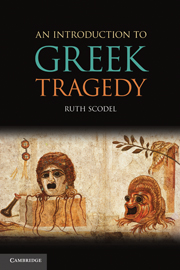5 - Persians
Published online by Cambridge University Press: 05 June 2012
Summary
SYMPATHY FOR THE PERSIANS
Aeschylus's Persians, the oldest surviving tragedy, is also among the most obviously political. Produced in 472 BCE, it dramatizes the response at the Persian court to the Greeks' defeat of the Persian fleet at the battle of Salamis only eight years earlier. Not only was the war recent, it was not over. Following the failure of the Persian invasion in 480 and 479 BCE, the Greeks had launched counterattacks to free the Greek city-states that had been under Persian rule when the war began. Athens was the leader of a permanent alliance against Persia, the Delian League. The League was itself to become an oppressive empire, and it is possible to see the play as a prescient warning to the Athenians against becoming like their enemies.
Persians was not the first tragedy on this theme. Phrynichus's Phoenician Women was probably produced in 476 BCE with Themistocles, the Athenian most responsible for the victory, as chorêgos. The play opened as a eunuch put cushions on seats for the councillors and reported the defeat of Xerxes. While Aeschylus's tragedy also puts Persian luxury on display, it does not have any eunuchs; castrating boys was an “Eastern” practice, and this opening negatively defined the Persians very emphatically from the beginning. Aeschylus's opening line closely echoes the opening line of Phrynichus's play, seemingly inviting the audience to compare the two treatments.
- Type
- Chapter
- Information
- An Introduction to Greek Tragedy , pp. 72 - 84Publisher: Cambridge University PressPrint publication year: 2010



